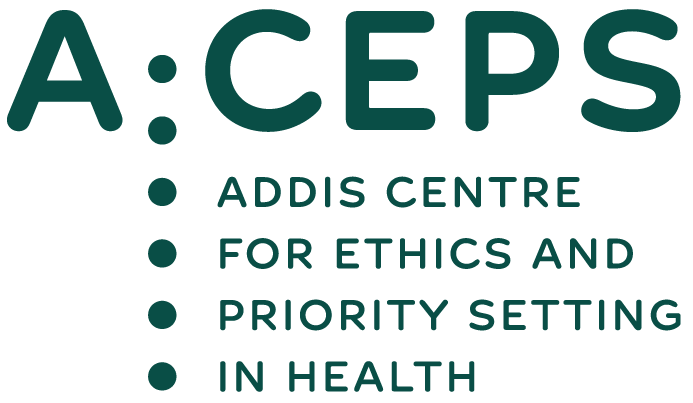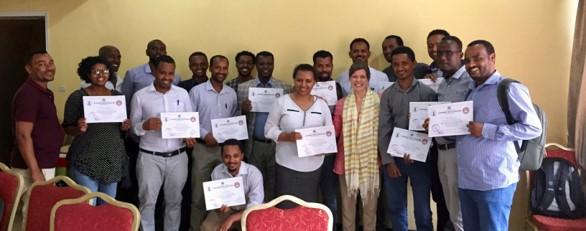Addis Centre for Ethics and Priority Setting (ACEPS)
ACEPS aims to be a regional hub for knowledge exchange on priority setting and benefit package design in East Africa.

Hovedinnhold
Addis Centre for Ethics and Priority Setting (ACEPS)
The Addis Center of Ethics and Priority Setting (ACEPS) is a research center established in 2017 through a collaboration between Addis Ababa University (AAU) and the Bergen Centre for Ethics and Priority Setting (BCEPS), University of Bergen. ACEPS aspires to be a regional hub for knowledge exchange on priority setting and benefit package design in East Africa.
Main Activities
- Provide technical support to key policy undertakings at the Ethiopian Ministry of Health and Ethiopia Health Insurance Service
- Capacity building for staff members of the Federal Ministry of Health
- In collaboration with institutions from within and outside Ethiopia, conducting research activities mainly focused on economic evaluation of health interventions
- Provides supports on priority setting of health interventions
- Providing medical ethics course for medical students at the College of Health Sciences, Addis Ababa University
- Leading the reestablishment and functionality of the Clinical Ethical Committee (CEC) of Tikur Anbessa Specialized Hospital (TASH), the center hosts and facilitates regular and emergency meetings of CEC.
Revision of essential health services package in Ethiopia
ACEPS in collaboration the Ethiopian Federal Ministry of Health has supported the revision of the essential health services package in Ethiopia in 2019.
Designing a health insurance benefit package in Ethiopia
ACEPS in collaboration with the Ethiopian Health Insurance Service has led the Design of the health insurance benefits package in Ethiopia. The package aims to address the prevailing disease conditions in Ethiopia, increase the efficiency of the health system, ensure equitable access to health services and interventions, protect the population against catastrophic health expenditures, and increase participation and transparency in decision-making in the health sector. The process involved use of data, dialogue, and decision through a participatory approach with the involvement of key stakeholders.
Current Projects in Health Economics and Priority Setting
In collaboration with BCEPS, ACEPS is leading projects on economic evaluations of Rheumatic Heart Disease (RHD) and Chronic Kidney Disease (CKD) in Ethiopia
1. Costs and Cost-Effectiveness of Rheumatic Heart Disease (RHD) Interventions in Ethiopia
There are limited or no studies that have assessed the cost and cost-effectiveness of surgical management of RHD in Africa. In addition, it is unclear whether scale up of these interventions is affordable for a typical African country given tight health budgets. Focusing on Ethiopia, BCEPS at the University of Bergen, Norway and ACEPS in Ethiopia are conducting an economic evaluation study on RHD with the following three main objectives:
- To estimate how much it cost to deliver rheumatic heart disease-related surgery and medical management of RHD in a hospital setting.
- To examine the cost-effectiveness of heart surgery in a hospital setting.
- To model resource requirements, including human resources and diagnostics, for scaling up RHD surgery, primary prevention, and secondary prevention for Universal Health Coverage (UHC). Cost data from the provider's perspective have been collected from six hospitals in four regions of Ethiopia (Addis Ababa, Oromia , Sidama and Amhara).

Foto/ill.:
ACEPS. Training sessions for data enumerators for the economic evaluation of RHD in Ethiopia
|

Foto/ill.:
ACEPS. Facility visit for data collection by data enumerators and project PI.
|
2. Chronic Kidney Disease in Ethiopia: Out-of-Pocket expenditure, cost and cost-effectiveness analysis of renal replacement therapy.
Evidence on the cost-effectiveness of CKD interventions to improve outcomes of patients within developing countries is scarce and nonexistent in Ethiopia. To inform decision-making and support the programmatic implementation of CKD interventions at scale, an assessment of OOP expenditures and provider’s cost for CKD care, including cost-effectiveness analysis for CKD care is required. Therefore, in order to assess the cost and cost-effectiveness of alternative CKD interventions in Ethiopia, ACEPS is conducting a study with the following three main objectives:
- To estimate out-of-pocket health expenditure and associated impoverishment for the treatment of chronic kidney disease in Ethiopia
- To estimate the cost of renal dialysis and kidney transplantation from the providers perspective in Ethiopia
- To conduct a cost-effectiveness analysis of kidney transplantation in comparison to renal dialysis and renal dialysis to do-nothing for end-stage renal disease in Ethiopia

Foto/ill.:
ACEPS. Data collection on out-of-pocket expenditures and facility costing at National Kidney Transplant Centre (NKTC) for CKD care.
|
3. Childhood cancer control
The attention to childhood cancer control in low- and middle-income countries (LMICs) is low despite a high burden and mortality. Close 90% of childhood cancer occurs in LMICs and only 20-30% survive despite the high curability of childhood cancer even in a resource constraint setting. Number of factors contribute to the low survival rate such as unavailability of specialized pediatric oncology centers and supplies, inadequately trained personnel, suboptimal supportive care, late presentation, insufficient social support, and the high treatment abandonment rate in LMICs.
The World Health Organization (WHO) Global Initiative for Childhood Cancer calls for investing in childhood cancer control including evidence generation. BCEPS and ACEPS are jointly conducting research with the following objectives:
- To assesses the magnitude of treatment abandonment and the influencing risk factors,
- To estimates the cost of running a pediatric oncology unit in Tikur Anbessa Specialized Hospital (TASH),
- To estimate the overall cost-effectiveness of running a pediatric oncology unit at TASH.
4. Integrated NCD care service delivery
Events organised by ACEPS
Three-day course in Evidence-Based Priority Setting
This was a 3-days training that was held in Addis Ababa in November 2019 with 12 participants from ministries of health of Zanzibar, 5 from Malawi and 3 from Ethiopia.
Six-day course in Basic Cost-Effectiveness Analysis and costing using the OneHealth tool (OHT)
A 6-day training course covering the basics of cost-effectiveness analysis and costing of health interventions using the World Health Organization’s OHT was held in Zanzibar in February 2020 with 12 participants from Zanzibar and 4 from Malawi.
Three-day workshop on the basics of medical and clinical ethics, methods of ethical analysis and prioritization was held in Addis Ababa from November 16 - 18, 2022 with 19 participants from different departments of Tikur Anbessa Specialized Hospital.
The workshop was given to participants from the Oncology, Anesthesia, Gynecology and Obstetrics, Neurosurgery, Orthopedics, Laboratory, and Pharmacy departments of the hospital. Brief presentations, brainstorming, and discussion were conducted on the basic definitions of Ethics and Ethics theories, Introduction and principles of Medical Ethics, Bedside rationing and priority setting, Reproductive health ethics, Methods and examples of ethical analysis, and case studies on ethical dilemmas were shared and discussed.
One-day workshop on Developing Recommendations to Support the Integrated Delivery of NCD Care
The workshop was organized by ACEPS and held in Addis Ababa with the following objectives:
- To identify high-priority NCD interventions in Ethiopia and the current modality of NCD services delivery;
- To discuss the available evidence on Integrated NCD care delivery in Ethiopia and evidence gaps;
- To discuss the governance and financing of NCD in Ethiopia.
Sixteen experts from the Ministry of Health, Addis Ababa University, Ethiopian Health Insurance Service, Saint Paul Hospital Millennium Medical College and Ethiopia Public Health Institute participated in the workshop.

Foto/ill.:
ACEPS. Workshop on priority setting and NCD integrated care delivery.
|


